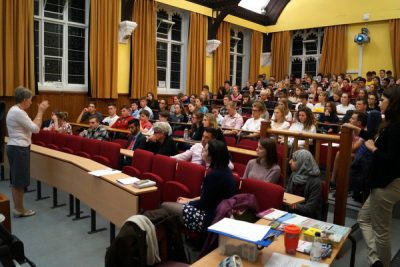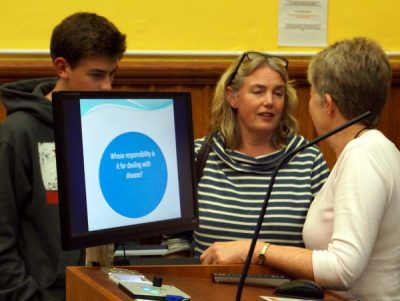Maya Tyrrell, Wyedean, reflects on lecture about disease in developing world
Maya Tyrrell, Student at Wyedean School reporting..
Upon arrival after a lively bus journey, the Geographers from Wyedean School alongside students from the region began to settle quickly into the Peel Lecture Theatre, School of Geographical Sciences, Bristol. The much-anticipated lecture, delivered by Gill Miller, produced an insight into challenges facing global/local stakeholders in dealing with disease in the developing world; a topic at the forefront of political debate within global players, and one of general interest amongst the keen in the lecture theatre. After a brief but obligatory Branch AGM meeting, the evening’s learning could commence, a full lecture theatre attentive to the topic in hand.

The Lecture
As an introduction to the global challenges concerned with disease in the developing world, the following questions were prosed: Whose responsibility is it for dealing with disease? And where do you start? With so many global players and NGOs to influence a response to an outbreak, the most effective and realistic response is impossible to compose. The key players in responding to disease outbreaks were then established; global influences (WHO, UN, INGOs), national influences (Government + Ministry of Health) and local influences (Communities, local NGOs). The role of local women in the community was demonstrated as a particularly beneficial influence to those effected by disease although in most societies, the women remain ‘conspicuously invisible’ due to ignorance within local players. The role of women within a disease ridden community was further explored considering the cultural landscape and the gendered perspective of aid funding services which provoked debate and raised questions into the fairness of global attitudes.

The lecture progressed onto investigating the effectiveness of the global response to the 2014 Ebola outbreak. It was established that the epidemic could have been prevented as the MSF flagged up the 1st cases in December 2013 yet the signs were ignored by WHO. This raised the question whether the lives terminated by the outbreak could have then been saved if it were for a greater depth of earlier investigation. Then, it was made clear that the sheer volume of global players made the task of responding effectively to the Epidemic impossible; an anecdote of the ambulances used within the outbreak kindled great debate as to how the funding was being managed.
As a contrast with the familiar Ebola epidemic, the unfamiliar ‘Jiggers’ was introduced: A flea found in Africa that causes severe ulceration and inflammation of limbs if embedded into the skin. The treatment and impacts of Jiggers were then presented; distressing images and case studies of affected villages being used to illustrate the severity of the disease. Then the main issues were raised – how Jiggers went unnoticed by the global players and how it completed for funding to control the epidemic. It was quickly confirmed that national influences and work from advocates played the main role in controlling the disease, unlike the UN orientated response to the Ebola outbreak.
To conclude the lecture, the importance of global and national policies to control outbreaks were confirmed, supporting the significance of women in the community/in global leadership positions. The same opening question was posed for the second time, provoking a different and new-founded analytical approach to producing a response having learned of the crucial points to consider.

Coming away from the experience, I have learned a great deal about the significance of local players in combating disease outbreak, specifically women and their holistic, caring approach. The lecture provided a real insight into the responses to two diseases, which I can now use as case studies in my OCR exam next year on Disease Dilemmas. I would like to thank the GA for putting on such an interesting and thought provoking lecture at the University of Bristol.
Maya Tyrrell
